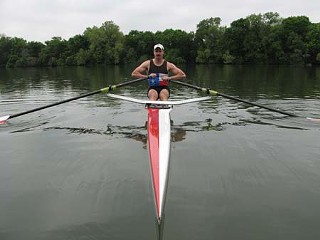Playing Through
Realize your long-held rowing dreams at the Texas Rowing Center
By Thomas Hackett, Fri., April 25, 2008
When I was in high school and thinking about the fairy-tale college I hoped to attend, it didn't take much to send me into a swoon. If you were getting those same college brochures, maybe you know what I'm talking about. There'd be a picture of a multicultural group of friends sitting on a spring lawn, laughing, one playing a guitar; a shot of a handsome couple walking through an autumnal bower; an image of a pretty girl sitting cozily in a window alcove, reading her Norton Anthology. But what did it every time was the photograph of hale collegians sculling on a glassy river.
That, I imagined, was going to be my idyllic life. I'd scull at sunrise and at sunset. I'd scull alone, and I'd scull with seven of the greatest guys you'd ever want to meet, real Abercrombie & Fitch kind of guys, rowing together as one.
It never happened, of course. If my college really did have a rowing team, I never saw the misty river where it did its sculling.
But Matt Knifton (pictured) is offering me another chance. Knifton, 40, is the owner of the Texas Rowing Center, on Lady Bird Lake, about a quarter mile west of the Lamar Boulevard Bridge (parking available on Stephen F. Austin Drive). There are a lot of things I liked about Knifton right off the bat, but what I liked most is that he's no snob.
"We're like the McDonald's of rowing," he tells me after his early-morning workout. "There's always been an elite stigma to rowing, a way of maintaining class identity for the blue bloods. I've dedicated myself to overcoming that. Just show up any day of the week and say, 'I'd like to learn to row,' and in an hour you'll be on the water."
Perhaps that openness has something to do with Knifton's own experience of exclusion. After rowing for four years at the University of Texas, he tried out for the 1992 Olympic team. At 6 feet 4 inches tall, with massive shoulders and powerful legs, it would seem he had the right stuff. But he didn't make the final cut. "That was tough," he says. "I got all the experience of training for the Olympics that the other guys did – everything except the Olympics."
With no money to be made in rowing, he briefly hung up his oars for law school. But after settling into a career as an environmental attorney, he returned to the Rowing Center, where he'd worked in college, and eventually bought the outfit, building a new boathouse and dock (accommodating 60 shells, plus another 60-some canoes and kayaks, all of which are available for hourly rental). He also still competes nationally on the masters level, pulling his weight on six national championship boats.
"There's just a Zen thing that goes with rowing," he says. "The boats are really quiet, and you feel like you're flying on the water, like a bird. It's a very rhythmic motion, and when the endorphins kick in – I don't care how old you are, that feeling doesn't change."
I'm swooning again.
For comments and suggestions e-mail [email protected].









